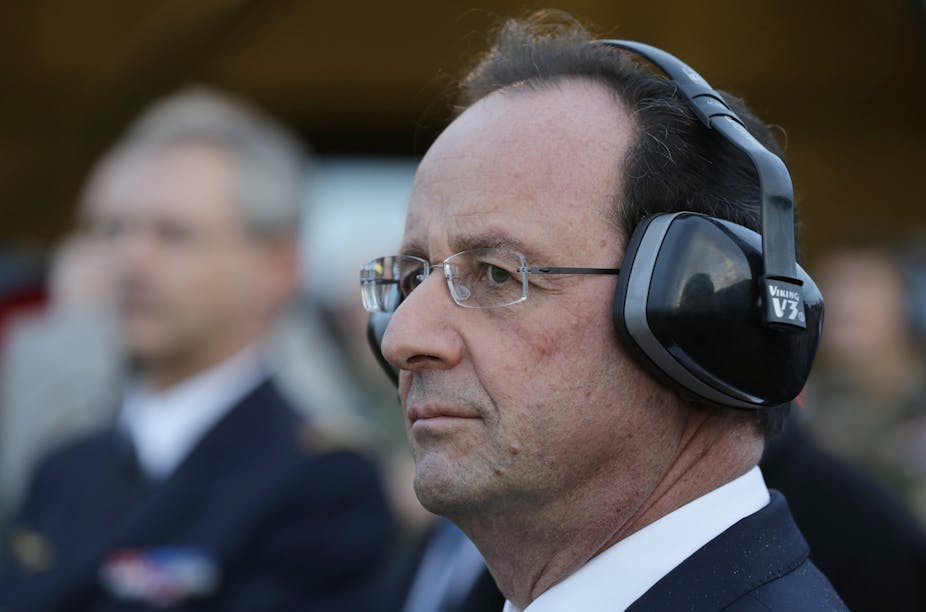Why does the economic policy pursued or proposed by the Left in Europe often seem so pathetic? The clearest example of this lies just across the channel. France is subject to the same fiscal straitjacket as other Eurozone countries, but when a left-wing government was elected in April 2012, they proposed staying within this straitjacket by raising taxes rather than cutting spending.
Although sensible from a macroeconomic point of view, this encountered hostility from predictable quarters, as I noted here. But in January this year the French president, Francois Hollande, announced a change in direction, proposing tax cuts for business and public spending cuts. When your macroeconomic announcements are praised by Germany’s foreign minister as courageous, you should be very worried indeed. Any hopes that Hollande might lead a fight against austerity in Europe completely disappeared at that point.
You could argue that France was initially trying to oppose irresistible economic and political forces, and no doubt there is some truth in that. But what was striking was the manner in which Hollande announced his change in direction. He said “It is upon supply that we need to act. On supply! This is not contradictory with demand. Supply actually creates demand”. This is not anti-Left so much as anti-economics. Kevin O’Rourke suggests this tells us that to all intents and purposes there is no Left in many European countries. It would indeed be easy to tell similar stories about the centre-Left in other European countries, like Germany or the Netherlands. With, that is, the possible recent exception of the Vatican!
Unfortunately Europe here includes the UK. Labour’s shadow chancellor, Ed Balls, was correct in saying that the government’s austerity measures were too far, too fast, yet the party now seems to want to show they are as tough on the deficit as George Osborne. (Its opposition prior to that often appeared half hearted and apologetic.) Again you could argue that they have no choice given the forces lined up against them, and again I would agree that this is a powerful argument, but I cannot help feeling that this not the complete story.
Missing the boat
I am not trying to suggest that if Labour had taken better positions, it would have necessarily made much difference. Take the issue of flooding, where Labour did try. The BBC failed to “call” this issue, by for example reproducing the official data shown here, and instead fell back on “views on shape of the earth differ” type reporting. Here the BBC failed in its mission to inform, and instead behaved in a quite cowardly manner. But at least in this case Labour tried.
What strikes me about the economic pronouncements of the Labour Party is the number of tricks they miss. On too far, too fast, for example, an obvious line of attack would have been to note how Osborne did change his policy (proclaiming “U turn!”, “he finally followed our advice”, etc). In addition they could say the recovery only took place once austerity was (temporarily) abandoned. Simplistic stuff I agree, but this is politics. To take a much more recent example, an easy line for Labour to take on the last budget and pensions was that Osborne’s policies would reduce incomes for prudent pensioners. Yet all Labour seems to be saying is that they will support the reforms, but want to wait to see the details. In other words, there is no opposition to the government’s claim that this was a budget for savers and pensioners.
With austerity and pensions there may be subtle factors that I have missed, but in their absence one conclusion you could draw is that the Labour Party in the UK is not getting good economic advice. I’m afraid I have no deeper knowledge on whether this is true or not. That has to be the conclusion in the case of Hollande’s apparent embrace of Say’s Law. Yet I doubt that the Left does not want good economic advice. As I noted here, in the last Labour government the influence of mainstream economics had never been greater. Is this a paradox?
Perhaps not, if you think about resources and institutions. Seeking out good advice (and distinguishing it from bad advice) takes either money or time. An established government finds this much easier than an opposition or a new government. When Labour came to power in 1997 they did immediately introduce well-researched and judged innovations in monetary and fiscal policy, but they had had 18 years to work them out.
Taking advice
In addition, with the Eurozone there may be a factor to do with governance. I have just read a fascinating paper by Stephanie Mudge, which compares how economic advice was mediated into left-wing thinking in the 1930s compared to today. To quote:
It stands to reason that an economics that works through inherently oppositional national-level partisan institutions would be especially fertile terrain for the articulation of alternatives; an economics that keeps its distance from partisan institutions and is more removed from national politics, but is closely tied to Europe’s overarching governing financial architecture, probably is not.
What is certainly true for both the Eurozone and the UK is that leaders of independent central banks often appear naturally disposed to fiscal retrenchment.
This gives us two problems that occur for the Left and not the Right. However, the Right has two problems of its own when it comes to getting good policy advice. The first comes from a key difference between the two: the Right has an ideology (neoliberalism), the Left no longer does. The second is that the resources for the Right often come with strings that promote the self interest of a dominant elite. So although the Right has more resources to get good economic advice, these strings and their dominant ideology too often get in the way. That said, what this ideology and these resources are very good at is providing simple sound bites as well as a clear, and electable, narrative.

